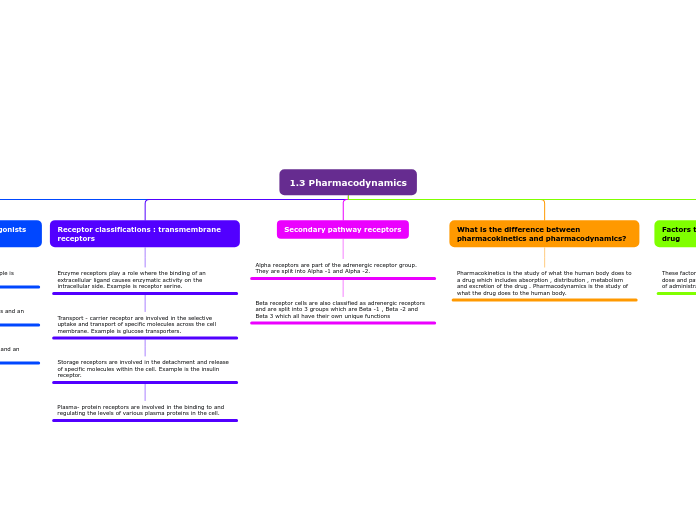1.3 Pharmacodynamics
Classification of agonists , partial agonists and antagonists
Agonists are classified as opioid drugs and a example is morphine
Partial agonists are classified as partial opioid drugs and an example buprenorphine
Antagonists are classified as opioid receptor drugs and an example noloaxne
Receptor classifications : transmembrane receptors
Enzyme receptors play a role where the binding of an extracellular ligand causes enzymatic activity on the intracellular side. Example is receptor serine.
Transport - carrier receptor are involved in the selective uptake and transport of specific molecules across the cell membrane. Example is glucose transporters.
Storage receptors are involved in the detachment and release of specific molecules within the cell. Example is the insulin receptor.
Plasma- protein receptors are involved in the binding to and regulating the levels of various plasma proteins in the cell.
Secondary pathway receptors
Alpha receptors are part of the adrenergic receptor group. They are split into Alpha -1 and Alpha -2.
Beta receptor cells are also classified as adrenergic receptors and are split into 3 groups which are Beta -1 , Beta -2 and Beta 3 which all have their own unique functions
What is the difference between pharmacokinetics and pharmacodynamics?
Pharmacokinetics is the study of what the human body does to a drug which includes absorption , distribution , metabolism and excretion of the drug . Pharmacodynamics is the study of what the drug does to the human body.
Factors that determine the side efffects of a drug
These factors include chemical structure , pharmacokinetics , dose and patient factors such as age, drug interactions, route of administration.
